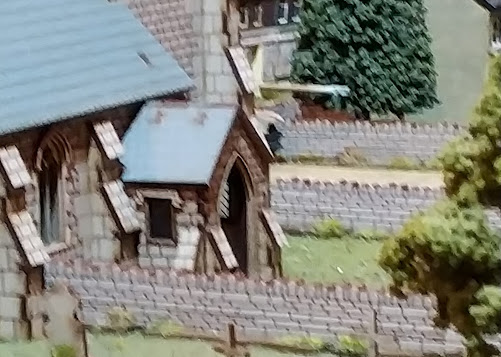Our regular Monday game was moved to Tuesday night this week due to T having a work commitment, which was just as well because I approached the game with a clearer head than would have the previous night. Nothing self-inflicted, just recovering from a nasty cold.
This week we returned to the French and Indian War, 1757-1759 (Worthington Publishing, 2020) one of my declared 6x6 games. Once again, I deployed as the French, T as the British, and once again it was a tight match. We ended up playing through the full three years (early winters each, so no bonus turns) All the first year and into the second, T played a very aggressive game, as my settlements in the western interior fell one by one. The only thing that slowed his progress was the arrival of winter (end of 1757).
 |
| I have seen the enemy, and he wears French cuffs. |
I realised between last week’s and this week’s game that there were a couple of things that we did wrong; In the first game I attacked Halifax from Louisbourg when I shouldn’t have been able to, T holding the control of the Atlantic at the time. The game wasn’t so close that the extra two points would have decided it, but this time I quietly took control of the Atlantic uncontested while T went on his eastern rampage, and held it for the whole game. I took Halifax legitimately at the end of the second year, wintered there (I was unable to place reinforcements there as all hands were needed to shore up the fort defences at the other end of the board), and pushed on to Boston at the beginning of my spring offensive. This blunted T’s anticipated push in the centre somewhat – Boston could not fall to the dirty French – and he diverted troops back along the southern coast and we-took the city two turns later, then pushing on to dive me out of Halifax. But had he not been provoked to defend his western cities, T was set to push through my brittle defence of Forts Carillion and Frontinac, which would have almost certainly cost me the game.
 |
| The British march on Le Boeuf in force. |
The other thing we had missed in the previous
week’s game was winter attrition. At the end of the yearly cycle (the beginning
of winter), any troop numbers in excess of the VP value of the settlement in
which they are located must take a strength reduction of one point, two if it’s
an occupying force in an enemy settlement (the first irregular unit gets a pass
on this, since they’re used to the harsh winters). We both took penalties to
our troop strengths in the west; T took the bigger hit, but her could afford
to. At the end of the second year, with an eye to the turn track, I managed to
maintain all of my units at their current strength, while T took reductions to
a couple of Militia units (men going home to be with their families, no
doubt).
 |
| The Marines take Hampshire unopposed |
The third year was a stalling exercise for my
side. Scoring rounds occur at the end of each year. VPs are gained on a simple
metric of one for each enemy unit taken out of the game (scored immediately)
and how many enemy locations you hold – the ones where you actually have troops
positioned – at the end of the year (the step before winter attrition). If one
side has a clear ten-point superiority over the other, the war ends that year.
If it runs to the third year, the onus is on the British to gain that ten-point
lead, or victory defaults to the French. I didn’t mind relinquishing Boston and
Halifax, because those forcing T to regain them meant two crucial turns, he
couldn’t attack anywhere else, as well as tying up a not-insignificant portion
of his resources. At the end of 1759, T did have a lead on me, but by the
fourth turn of that year, there was no way he could come back to take victory.
France prevailed, and the fur trade was maintained (a little longer). But we
did manage to trim about forty minutes off the playing time from last week.
 |
| The final scores. |
Wednesday night saw the group fighting in western France, circa July 1944. I believe B had a scenario set up for Bolt Action (Osprey Games, 2012; three buildings (including a magnificent cathedral with a removable roof-piece, roughly in the centre of the play area, with the two roughly numerically even sides, seasoned SS troops who had been recuperating in France after service on the Eastern Front, and D-Day-bloodied US infantry, converging on the town in the hopes of capturing the key locations. The Germans had a Panther tank in support, and the Americans had two Shermans (known colloquially among the German anti-tank teams as “Tommy-cookers;” true, as it turned out).
 |
| "I see the little silhouetto of a tank..." |
Sides were drawn mostly at random – K had a
particular desire to play the Germans, while the other spots went to H, D and
myself as the Americans, and B taking up the other German units.
 |
| Advancing with caution (and armour support). |
 |
| "Tommy-cookers" |
On the Americans; drawing the first activation, K brough his Panther to bear on the second Sherman and dispatched it with ruthless efficiency. Thinking it would be unsporting to concede defeat then and there, the Americans fought on bravely but in vain; we inflicted some losses on the adversary, gave him pause in places, but the will (and canny die rolls) of the Germans carried the day.
 |
| Fierce house-to-house fighting. |
.jpg)






No comments:
Post a Comment